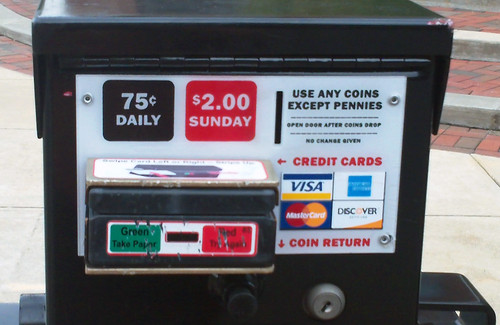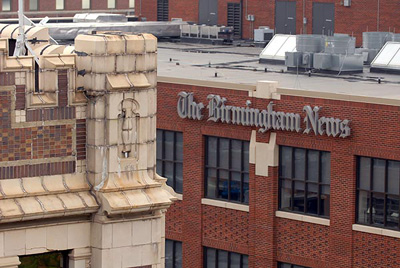Editors note: I will be one of the panelists participating in WBHM’s next installment of Issues and Ales at Cantina’s* Pepper Place location on Thursday evening, October 4. We’ll be talking about the future of journalism in North Central Alabama.
I figured before I appeared before a group talking about my thoughts that I should share some of them here on the site. Please feel free to chime in here in the comments section or come on out Thursday evening.
 Everyone seems to have an opinion about it – the future of journalism. I’ve recently watched one forum take place in New Orleans (courtesy of the folks at the Oxford American) and awaiting hearing what happens at one my digital compatriot Andrew Huff will take part in later this month in Chicago. This is all while I prepare to add my voice to the cacophony of viewpoints about North Central Alabama’s journalistic future following the recent changes at the Advance Media Group titles – including the one here in Birmingham – on October 4.
Everyone seems to have an opinion about it – the future of journalism. I’ve recently watched one forum take place in New Orleans (courtesy of the folks at the Oxford American) and awaiting hearing what happens at one my digital compatriot Andrew Huff will take part in later this month in Chicago. This is all while I prepare to add my voice to the cacophony of viewpoints about North Central Alabama’s journalistic future following the recent changes at the Advance Media Group titles – including the one here in Birmingham – on October 4.
I haven’t written much of anything these last three weeks because of it. I’ve been wondering if we’re asking the right questions – or rather, the right people.
The future of journalism is now. It also is much more reliant on the habits of those who seek to consume content, those funding it, and those willing to create what’s needed for it to be consumed. It’s tough to fully represent all of these interests when most of the voices included on these panels represent those producing the content. I was wondering if I was the only one thinking this way; thankfully, that’s not the case…
It’s not even news anymore, it’s content. It can be user-generated or about something that may entertain now but fades into obscurity when compared to items that can shape the future of a community. It also means it doesn’t have to come from a “trusted news source” – at least not initially.
I’ve been wondering if the question to be posed shouldn’t be, “How will the public choose to receive their news?” Most seem to acknowledge it will be a platform and layout agnostic world (as new products like Quartz appear to recognize), but we haven’t actually figured out how to customize that experience in each community. We still seem set to take an assembly-line approach – one that could be detrimental to the long-term survival of journalism as we know it.
As some of us like to point out on occasion, the sentence hanging above the entrance to Birmingham’s City Council chambers states “The People are the City.” If anything, we’ve done a great job listening to what we think advertisers want while not necessarily identifying how to marry that with how our community chooses to take in the news of the day. You may be surprised to learn about resources to help you do what you want if you do talk with them.
I’m not a fool. We can’t always wait to hear from the community. The publisher of my hometown paper took a now celebrated approach that made sure the Old Gray Lady was profitable enabling it to share “All the News That’s Fit to Print.” It is important to remember though that advertisers like to go somewhere where there’s people. It doesn’t hurt that they listen to consumers and have diversified just enough to be dangerous.
Those leading the reformation of the news process need to be willing to look at how to modify the wheel, not necessarily reinventing it. In my case, it’s even involved seeing if a local brewery would be willing to take a chance on creating a porter for our relaunch of our monthly offline gatherings (the first batch will be available at Good People Brewing Company on October 11). It also means completely revamping our online store and making a big push starting Thursday afternoon to sell some shirts (& reintroduce our voluntary subscriptions) in order to fulfill previous orders and to generate operating capital so I can let some folks join me in chasing windmills across Red Mountain.
Would having a porter release work for you? It depends on if your community loves craft beer as much as Birmingham does (by the way, we love it a lot). We’re a community that loves to voice our opinions though there are times we seem scared to stand by them. You need to ask your community what works for them.
It may work. It may not. I figure it’ll be fun regardless.
Is it a crisis in journalism? For those who have lost and will continue to lose their jobs, yes. For those the list of others I mentioned in the beginning, it’s more of a maze they’re trying to navigate through to see what works best for them. We need to be listening to them more about what they seek. Perhaps some new opportunities for niche publications exist for those who’ve recently been forced out at legacy publications.
There’s the idealistic approach that many take stating we must provide something of value to our community. Our community hasn’t necessarily voiced their opinion about how they want to receive their news. Or have they? Are they even paying attention? The reactions one person in Louisiana stumbled across may surprise you.
What does the community want? What does it need? Have we asked them?
At the end of the day, we can spend more time talking about best practices and not about silver bullets. It’s still only part of the solution – one that sometimes points to what’s useful instead of what’s new.
André Natta is the stationmaster for bhamterminal.com.
Photo: New Birmingham News boxes downtown. acnatta/Flickr.
*The “i” everyone thinks is in the front of the name Cantina as it appears in its logo is actually an upside down exclamation point.





 There’s been something nagging at me for a while now about
There’s been something nagging at me for a while now about 

The future of journalism? It depends on the consumer.
Editors note: I will be one of the panelists participating in WBHM’s next installment of Issues and Ales at Cantina’s* Pepper Place location on Thursday evening, October 4. We’ll be talking about the future of journalism in North Central Alabama.
I figured before I appeared before a group talking about my thoughts that I should share some of them here on the site. Please feel free to chime in here in the comments section or come on out Thursday evening.
I haven’t written much of anything these last three weeks because of it. I’ve been wondering if we’re asking the right questions – or rather, the right people.
The future of journalism is now. It also is much more reliant on the habits of those who seek to consume content, those funding it, and those willing to create what’s needed for it to be consumed. It’s tough to fully represent all of these interests when most of the voices included on these panels represent those producing the content. I was wondering if I was the only one thinking this way; thankfully, that’s not the case…
It’s not even news anymore, it’s content. It can be user-generated or about something that may entertain now but fades into obscurity when compared to items that can shape the future of a community. It also means it doesn’t have to come from a “trusted news source” – at least not initially.
I’ve been wondering if the question to be posed shouldn’t be, “How will the public choose to receive their news?” Most seem to acknowledge it will be a platform and layout agnostic world (as new products like Quartz appear to recognize), but we haven’t actually figured out how to customize that experience in each community. We still seem set to take an assembly-line approach – one that could be detrimental to the long-term survival of journalism as we know it.
As some of us like to point out on occasion, the sentence hanging above the entrance to Birmingham’s City Council chambers states “The People are the City.” If anything, we’ve done a great job listening to what we think advertisers want while not necessarily identifying how to marry that with how our community chooses to take in the news of the day. You may be surprised to learn about resources to help you do what you want if you do talk with them.
I’m not a fool. We can’t always wait to hear from the community. The publisher of my hometown paper took a now celebrated approach that made sure the Old Gray Lady was profitable enabling it to share “All the News That’s Fit to Print.” It is important to remember though that advertisers like to go somewhere where there’s people. It doesn’t hurt that they listen to consumers and have diversified just enough to be dangerous.
Those leading the reformation of the news process need to be willing to look at how to modify the wheel, not necessarily reinventing it. In my case, it’s even involved seeing if a local brewery would be willing to take a chance on creating a porter for our relaunch of our monthly offline gatherings (the first batch will be available at Good People Brewing Company on October 11). It also means completely revamping our online store and making a big push starting Thursday afternoon to sell some shirts (& reintroduce our voluntary subscriptions) in order to fulfill previous orders and to generate operating capital so I can let some folks join me in chasing windmills across Red Mountain.
Would having a porter release work for you? It depends on if your community loves craft beer as much as Birmingham does (by the way, we love it a lot). We’re a community that loves to voice our opinions though there are times we seem scared to stand by them. You need to ask your community what works for them.
It may work. It may not. I figure it’ll be fun regardless.
Is it a crisis in journalism? For those who have lost and will continue to lose their jobs, yes. For those the list of others I mentioned in the beginning, it’s more of a maze they’re trying to navigate through to see what works best for them. We need to be listening to them more about what they seek. Perhaps some new opportunities for niche publications exist for those who’ve recently been forced out at legacy publications.
There’s the idealistic approach that many take stating we must provide something of value to our community. Our community hasn’t necessarily voiced their opinion about how they want to receive their news. Or have they? Are they even paying attention? The reactions one person in Louisiana stumbled across may surprise you.
What does the community want? What does it need? Have we asked them?
At the end of the day, we can spend more time talking about best practices and not about silver bullets. It’s still only part of the solution – one that sometimes points to what’s useful instead of what’s new.
André Natta is the stationmaster for bhamterminal.com.
Photo: New Birmingham News boxes downtown. acnatta/Flickr.
*The “i” everyone thinks is in the front of the name Cantina as it appears in its logo is actually an upside down exclamation point.
Leave a comment
Posted in Commentary, media
Tagged future of journalism, jcarn